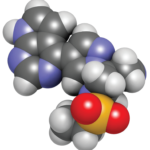 Researchers have long associated rheumatoid arthritis (RA) with endothelial dysfunction. Over time, endothelial dysfunction has emerged as a factor behind the elevated risk of cardiovascular disease in RA patients. A new systematic review and meta-analysis performed by Francesco Ursini, MD, PhD, clinical research fellow at the University of Catanzaro in Italy, and colleagues has found evidence that anti-tumor necrosis factor alpha (TNFα) treatment may improve endothelial function in patients with RA. The review, published online July 13 in Scientific Reports, acknowledges that many of the published studies had compromised methodology. The investigators could not determine whether any effect on endothelial function is class-specific or a result of a non-specific reduction in inflammatory burden.1
Researchers have long associated rheumatoid arthritis (RA) with endothelial dysfunction. Over time, endothelial dysfunction has emerged as a factor behind the elevated risk of cardiovascular disease in RA patients. A new systematic review and meta-analysis performed by Francesco Ursini, MD, PhD, clinical research fellow at the University of Catanzaro in Italy, and colleagues has found evidence that anti-tumor necrosis factor alpha (TNFα) treatment may improve endothelial function in patients with RA. The review, published online July 13 in Scientific Reports, acknowledges that many of the published studies had compromised methodology. The investigators could not determine whether any effect on endothelial function is class-specific or a result of a non-specific reduction in inflammatory burden.1
The search strategy initially identified 180 relevant studies. After screening the titles and abstracts, the investigators selected 34 studies for full-text examination, after which only 20 studies were included in the systematic review. Of these included studies, 16 were observational and only four were quasi-controlled. A total of 346 patients were treated with an anti-TNFα (infliximab=61, adalimumab=122 and etanercept=82). When the team used a random-effects model to perform a pooled analysis, they calculated an estimated standardized difference in means (SDM) of 0.987 (95% confidence interval [CI] 0.64-1.33, P<0.0001), which was consistent with an improvement of endothelial function with anti-TNFα treatment.
“Results from our systematic literature search show that the evidence on this issue relies on observational and quasi-controlled studies of relatively low quality and small size, while no randomized controlled trials were available for inclusion in the review,” explain the authors in their discussion. “Therefore, although providing information on surrogate measures pertinent with the outcome of interest, most of these studies were not adequately designed to investigate and catch a significant effect of anti-TNFα treatment on endothelial function. Moreover, studies were highly heterogeneous, particularly with respect to sample size, medications allowed, comorbid diseases, characteristics of patients (e.g., RA duration), follow-up period, specific anti-TNFα molecule administered and techniques for measuring endothelial function.”
Thus, the team concluded that it was difficult to generalize the results of the meta-analysis because of heterogeneity and evidence of possible publication bias. That said, a one-study-removed sensitivity analysis revealed that the pooled overall estimate remained stable following sequential exclusion of studies one at a time. This finding would suggest that the final conclusion of the meta-analysis had a low susceptibility to outliers. In addition, the year of publication did not appear to moderate the conclusions from the model.

